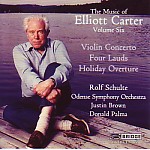If you’re ever going to have an Elliott Carter epiphany, then this might be the disc to bring it on. It’s not only spectacularly played and recorded–indeed, this performance of the Violin Concerto with soloist Rolf Schulte must be classed with the greatest violin and orchestra recordings ever made–but the juxtaposition of early and late Carter goes a long way toward explaining why his thorny, complex style is not merely another example of a contemporary composer towing the obligatory modernist line or practicing an intellectually sterile mind game, but rather was a necessary and inevitable development that permitted Carter to express himself in a way denied him by more traditional methods.
Specifically, if you compare the Holiday Overture (1944) to the Violin Concerto (1990) you will be forcefully struck by the greater expressive naturalness (not to mention emotional range) of the latter work. Now of course, as its title suggests, the overture is a happy, extravert piece in the first place, while the concerto medium implies very different possibilities. But at the same time, it’s quite clear in this early essay, which sounds a bit like fidgety, hyperactive Copland, that in Carter’s case traditional tonality was cramping his style. The music sounds overly busy, bursting at the seams with contrapuntal and rhythmic tensions yearning to break free of their tonal shackles.
On the other hand, in the Violin Concerto, despite (or because of) its free treatment of tonality and rhythm, each element (violin, orchestra, and the various orchestral sub-units engaging the soloist in dialog) has the ability to develop its own kind of music. Sometimes, as in the tarantella-like whirlwind finale, violin and orchestra work together or along similar lines. At others, as in the slow movement, where calm orchestral textures underpin an anguished (Carter’s word) solo cantilena, you can clearly hear two very different expressive temperaments at work simultaneously. Of course, this also is possible in more traditional tonal styles (think of Nielsen’s Clarinet Concerto, for example), but the point is that if you can get past the issue of tonality, you will find the Violin Concerto to be a far easier, expressively rich, and even comfortable piece of writing than the Holiday Overture, which comes across not so much as happy, but frenetic, even overwrought. In this latest phase of his long career, Carter seems to have tamed some of his innate exuberance in favor of greater expressive economy and precision, and the result is a lovely, lyrical work that never sounds cluttered.
As noted at the beginning of this review, much of this positive impression must go to soloist Rolf Schulte, who plays the music as though he has known and loved it all of his life, and who projects its variegated emotional highs and lows with unerring accuracy and, most of all, passion. He’s just as confident in the Four Lauds for solo violin, while conductors Justin Brown and Donald Palma have the Odense Symphony Orchestra operating at the peak of its form. Perfectly balanced, vivid sonics round out a disc that really does offer the most sympathetic means possible for entry into the challenging style of this brilliant, difficult composer. [2/20/2006]
































